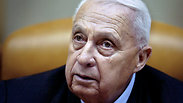
Ariel Sharon. 'Natural leadership which cannot be studied in any prime ministers' school'
צילום: AP
How I learned to love Arik
Op-ed: Former Prime Minister Ariel Sharon's personal secretary explains how she turned from a strong critic into an ardent fan
The last thing we talked about was avocado. It wasn't about anything important or an event in his demanding schedule, but about avocado. He insisted on knowing the variety of the avocado placed on his desk on the morning of his last day at the office. It seems that even after sitting on the prime minister's chair for almost five consecutive years, he was still the son of agronomist Samuel Scheinerman, who in the 1930s insisted on growing avocado in the Sharon region's lands, an act which at the time was received with surprise and ridicule.
At the end of our conversation, I promised to telephone him in the evening to wish him luck in the medical procedure he was scheduled to undergo the next day. But before I called, the first reports about his arrival at the Hadassah hospital and about a significant stroke had already emerged.
Eight years have passed since that last conversation. I think about him often, almost every day. I try to explain to myself what it was about that man which turned me from a critic with reservations, to say the least, into an ardent fan, a real groupie. Was it because, so unexpectedly as far as I was concerned, I discovered on the prime minister's seat a man who saw people around him? Who in the middle of so many meetings with world leaders and fateful discussions had the ability to look into his interlocutor's eyes and see what others did not always find the time to see, like sadness or distress?
And maybe it was because he opened a window for me into the beautiful and forgotten Land of Israel, and allowed me to learn first-hand about his childhood in Kfar Malal, about Unit 101, about the crossing of the Suez Canal, about years of touching "stardom" followed by years of political and public seclusion? And perhaps because I unintentionally found myself in an "agricultural enrichment program" as part of the Prime Minister's Office, with terms like "fly masks for horses" and mocking questions such as "you city people don't know what it is?"
Eight years have passed since then. Eight years in which he is both absent and present in our lives. During tough moments, on days when a feeling of a leadership void takes over, he slowly creeps into our thoughts. What would he do at this time, how would he act? I have frequently heard fighters from the Yom Kippur War talk about the moment they heard his voice on the communication net. People who sat in besieged strongholds, thinking about the end, and suddenly that voice, quiet and secure, giving them some moments of grace and a feeling of confidence that everything will be okay.
I also heard that quiet and secure voice on the "communication net" of the Prime Minister's Office. That's what I miss most of all. The mature, secure, levelheaded leadership. One which creates confidence that there is someone to rely on, that there is a responsible adult. Natural leadership which cannot be studied in any prime ministers' school.
I never called him by his first name, always "prime minister." For some reason, I couldn't get the word "Arik" out of my mouth. Now, on this sheet of paper, I am capable of saying it: Arik, I miss you, very much.
Marit Danon was the personal secretary of former Prime Ministers Yitzhak Shamir, Yitzhak Rabin, Shimon Peres, Ehud Barak and Ariel Sharon










